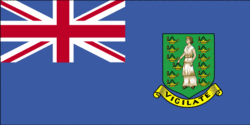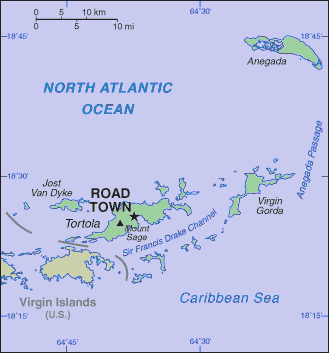Traveling Luck for British Virgin Islands. British Virgin Islands, North America
British Virgin Islands is located in Caribbean, between the Caribbean Sea and the North Atlantic Ocean, east of Puerto Rico.
Land in British Virgin Islands is coral islands relatively flat; volcanic islands steep, hilly.
British Virgin Islander land covers an area of 153 square kilometers which is about 0.9 times the size of Washington, DC
 British Virgin Islander national flag (Flag of British Virgin Islands)
British Virgin Islander national flag (Flag of British Virgin Islands)
As for the British Virgin Islander climate; subtropical; humid; temperatures moderated by trade winds.
British Virgin Islander(s) speak English (official).
Places of note in British Virgin Islands
 British Virgin Islander map
British Virgin Islander map
Regions of British Virgin Islands
First settled by the Dutch in 1648, the islands were annexed in 1672 by the English. The economy is closely tied to the larger and more populous US Virgin Islands to the west; the US dollar is the legal currency.
Country Profile for British Virgin Islands
The economy, one of the most stable and prosperous in the Caribbean, is highly dependent on tourism, generating an estimated 45% of the national income. An estimated 350,000 tourists, mainly from the US, visited the islands in 1998. Tourism suffered in 2002 because of the lackluster US economy. In the mid-1980s, the government began offering offshore registration to companies wishing to incorporate in the islands, and incorporation fees now generate substantial revenues. Roughly 400,000 companies were on the offshore registry by yearend 2000. The adoption of a comprehensive insurance law in late 1994, which provides a blanket of confidentiality with regulated statutory gateways for investigation of criminal offenses, made the British Virgin Islands even more attractive to international business. Livestock raising is the most important agricultural activity; poor soils limit the islands' ability to meet domestic food requirements. Because of traditionally close links with the US Virgin Islands, the British Virgin Islands has used the US dollar as its currency since 1959.
British Virgin Islander natural resources include NEGL
strong ties to nearby US Virgin Islands and Puerto Rico
British Virgin Islander religion is Protestant 86% (Methodist 33%, Anglican 17%, Church of God 9%, Seventh-Day Adventist 6%, Baptist 4%, Jehovah's Witnesses 2%, other 15%), Roman Catholic 10%, none 2%, other 2% (1991).
Natural hazards in British Virgin Islands include hurricanes and tropical storms (July to October).
Travel Advice for British Virgin Islands
British Virgin IslandsThis advice has been reviewed and reissued with an amendment to the Entry Requirements section. The overall level of the advice has not changed.
SUMMARY
- The British Virgin Islands (BVI) is a British Overseas Territory. There is no formal British diplomatic or consular representation in the BVI and the local authorities deal with all requests for consular assistance. The General section of this travel advice gives you more information about this.
- The hurricane season in the BVI normally runs from June to November. Please see Natural Disasters section of this Travel Advice and the Hurricane page on the FCO website. The BVI is also susceptible to floodings and earthquakes.
- The crime rate is low, but you should take sensible precautions against petty crime.
- You should ensure your safety at sea and on the roads.
- The threat from terrorism is low. But you should be aware of the global risk of indiscriminate terrorist attacks which could be against civilian targets including places frequented by foreigners.
- We strongly recommend that you obtain comprehensive travel and medical insurance before travelling. You should check any exclusions, and that your policy covers you for the activities you want to undertake. Please see: Travel Insurance.
SAFETY AND SECURITY
Local Travel
There are regular ferry services between Tortola and its sister islands of Virgin Gorda and Jost Van Dyke, and also to the US Virgin Islands.
Road Safety
Driving conditions can be hazardous, due to steep and narrow mountain roads, and poor driving standards.
Self-drive cars can be hired locally; a temporary driving permit or a local driving licence is required before driving. Cars are left-hand drive, and vehicles drive on the left as in the UK. Standard taxi fares exist for most destinations, but it is sensible to clarify the fare with the driver beforehand.
Sea Safety
The majority of visitors to the BVI participate in some form of water sports activities. The rate of accidents in and on the water is very low, but they do occur. Take care not to over-exert yourself, particularly if you are unaccustomed to swimming in the open sea or are unfit. Many accidents involve the consumption of alcohol to some degree. Fear and dehydration exaggerate the effects of alcohol, so care should be taken if you, or someone you know, have been drinking. Virgin Islands Search and Rescue (VISAR) respond to emergencies at sea.
LOCAL LAWS AND CUSTOMS
You should not have any involvement with illegal drugs, including marijuana. Possession of even small quantities of illegal drugs can lead to large fines or imprisonment. Drug trafficking is a serious offence. You should pack all your luggage yourself and you should not carry items that do not belong to you.
ENTRY REQUIREMENTS
All persons entering the BVI must have a valid passport with at least six months left on it.
British nationals do not need visas to visit the BVI. It is normal practice for BVI Immigration to issue you with a one-month entry stamp on arrival. You can then apply for an extension for up to six months. You may be required to provide evidence (e.g. an onward ticket) of your plans to leave the BVI at the end of your stay.
Single parents or other adults travelling alone with children should be aware that some countries require documentary evidence of parental responsibility before allowing lone parents to enter the country or, in some cases, before permitting the children to leave the country.
HEALTH
We strongly recommend that you obtain comprehensive travel and medical insurance before travelling. You should check any exclusions, and that your policy covers you for the activities you want to undertake. Please see: Travel Insurance. This should cover repatriation costs to the USA and medical treatment while there.
There is only one hospital in the BVI and medical facilities are limited. Complex medical problems are frequently referred to hospitals in the US Virgin Islands, Puerto Rico, or the mainland USA. The US visa waiver scheme does not apply to one-off charter flights. Special arrangements have to be made for any non-US visa holder who is medically evacuated by charter flight.
The dengue mosquito is found in BVI, and you should take normal precautions against mosquito bites.
You should seek medical advice before travelling and ensure that all appropriate vaccinations are up-to-date. For further information on health, check the Department of Health’s website at www.dh.gov.uk
NATURAL DISASTERS
The hurricane season in the BVI normally runs from June to November. You should monitor local and international weather updates from the World Meteorological Organisation. You can also access the National Hurricane Centre for updates. Please also see the Hurricanes for detailed information about what to do if you are caught up in a hurricane.
The BVI has experienced several minor earthquakes in recent years and also susceptible to floodings.
GENERAL
If things go wrong when overseas, please see: What We Can Do To Help
The Governor’s Office will assist British nationals in genuine emergencies wherever possible, but this does not cover the full range of consular services.
All passport enquiries should be made to the BVI Passport Office. Applications for replacement British passports are processed by the British High Commission, Bridgetown, Barbados through the BVI Passport Office. The turnaround time for applications is about three weeks.
There is a 15 US Dollars departure tax and 5 US Dollars security charge (per person) payable on leaving the BVI by air, and a 5 US Dollar security charge (per person) payable on leaving the BVI by sea.
OTHER
British Virgin Islands Tourist Board
 British Virgin Islander national flag (Flag of British Virgin Islands)
British Virgin Islander national flag (Flag of British Virgin Islands) British Virgin Islander map
British Virgin Islander map

 Search
Search British Virgin Islands country profile
British Virgin Islands country profile Travel advice for British Virgin Islands
Travel advice for British Virgin Islands